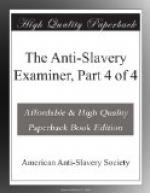[Footnote 13: Pittsburg pamphlet, p. 12.]
What is the “general principle” to which, whatever may become of despotism, with its “honest” admirers and “enlightened” supporters, human governments should be universally and carefully adjusted? Clearly this—that as capable of, man is entitled to, self government. And this is a specific form of a still more general principle, which may well be pronounced self-evident—that every thing should be treated according to its nature. The mind that can doubt this, must be incapable of rational conviction. Man, then,—it is the dictate of reason, it is the voice of Jehovah—must be treated as a man. What is he? What are his distinctive attributes? The Creator impressed his own image on him. In this were found the grand peculiarities of his character. Here shone his glory. Here REASON manifests its laws. Here the WILL puts forth its volitions. Here is the crown of IMMORTALITY. Why such endowments? Thus furnished—the image of Jehovah—is he not capable of self-government? And is he not to be so treated? Within the sphere where the laws of reason place him, may he not act according to his choice—carry out his own volitions?—may he not enjoy life, exult in freedom, and pursue as he will the path of blessedness? If not, why was he so created and endowed? Why the mysterious, awful attribute of will? To be a source, profound as the depths of hell, of exquisite misery, of keen anguish, of insufferable torment! Was man, formed “according to the image of Jehovah,” to




